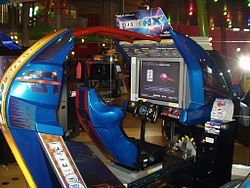F-Zero GX
| F-Zero GX | |
|---|---|
 |
|
| Developer(s) | Amusement Vision |
| Publisher(s) | Nintendo |
| Director(s) | Hiroyuki Sakamoto |
| Producer(s) |
Toshihiro Nagoshi Shigeru Miyamoto |
| Composer(s) |
Hidenori Shoji Daiki Kasho |
| Series | F-Zero |
| Platform(s) | GameCube |
| Release | |
| Genre(s) | Racing |
| Mode(s) | Single-player, multiplayer |
| F-Zero AX | |
|---|---|

F-Zero AX deluxe cabinet
|
|
| Developer(s) | Amusement Vision |
| Publisher(s) | Sega |
| Producer(s) | Toshihiro Nagoshi |
| Composer(s) | Hidenori Shoji |
| Series | F-Zero |
| Platform(s) | Arcade |
| Release | |
| Genre(s) | Racing video game |
| Mode(s) | Single-player, multiplayer |
| Cabinet | Standard (sit-down model) Deluxe (tilting seat) Monster Ride (Cycraft) |
| Arcade system | Triforce |
| Display | Raster, horizontal orientation |
| Aggregate score | |
|---|---|
| Aggregator | Score |
| Metacritic | 89/100 |
| Review scores | |
| Publication | Score |
| AllGame | |
| Edge | 8/10 |
| EGM | B+ |
| Eurogamer | 9/10 |
| Famitsu | 7, 8, 8, 9 of 10 |
| GamePro | 4.5/5 |
| GameSpot | 8.6/10 |
| IGN | 9.3/10 |
| PALGN | 8 1⁄2 |
| X-Play | |
F-Zero GX is a futuristic racing video game developed by Amusement Vision and published by Nintendo for the Nintendo GameCube console, which released worldwide in 2003. F-Zero GX runs on an enhanced version of the engine used in Super Monkey Ball. F-Zero AX, the arcade counterpart of GX, uses the Triforce arcade system board conceived from a business alliance between Nintendo, Namco and Sega. Published by Sega, it was released alongside GX in 2003.
F-Zero GX is the successor to F-Zero X and continues the series' difficult, high-speed racing style, retaining the basic gameplay and control system from the Nintendo 64 game. A heavy emphasis is placed on track memorization and reflexes, which aids in completing the game. GX introduces a "story mode" element, where the player assumes the role of F-Zero pilot Captain Falcon through nine chapters while completing various missions.
The F-Zero GX and AX project was the first significant video game collaboration between Nintendo and Sega. GX was well received by critics for its visuals, intense action, high sense of speed, and track design. Complaints centered on its sharp increase in difficulty that may alienate players.
F-Zero GX is a futuristic racing game where up to thirty competitors race on massive circuits inside plasma-powered machines in an intergalactic . It is the successor to F-Zero X and continues the series' difficult, high-speed racing style, retaining the basic gameplay and control system from the Nintendo 64 game. Tracks include enclosed tubes, cylinders, tricky jumps, and rollercoaster-esque paths. Some courses are littered with innate obstacles like dirt patches and mines. A heavy emphasis is placed on track memorization and reflexes, which aids in completing the game. Each machine handles differently, has its own performance abilities affected by its weight, and a grip, boost, and durability trait graded on an A to E (best to worst) scale. Before a race, the player is able to adjust a vehicle's balance between maximum acceleration and maximum top speed. Every machine has an energy meter, which serves two purposes. First, it is a measurement of the machine's health and is decreased, for example, when the machine hits another racer or the side of the track. Second, the player is usually given the ability to boost after the first lap. Boosting greatly increases the racer's speed for a few seconds, but also drains their energy. Pit areas and dash plates are located at various points around the track for vehicles to drive over. The former replenishes energy, while the latter gives a speed boost without using up any energy. The less time spent in the pit area, the less energy will regenerate. Courses may also have jump plates, which launch vehicles into the air enabling them to cut corners.
...
Wikipedia
